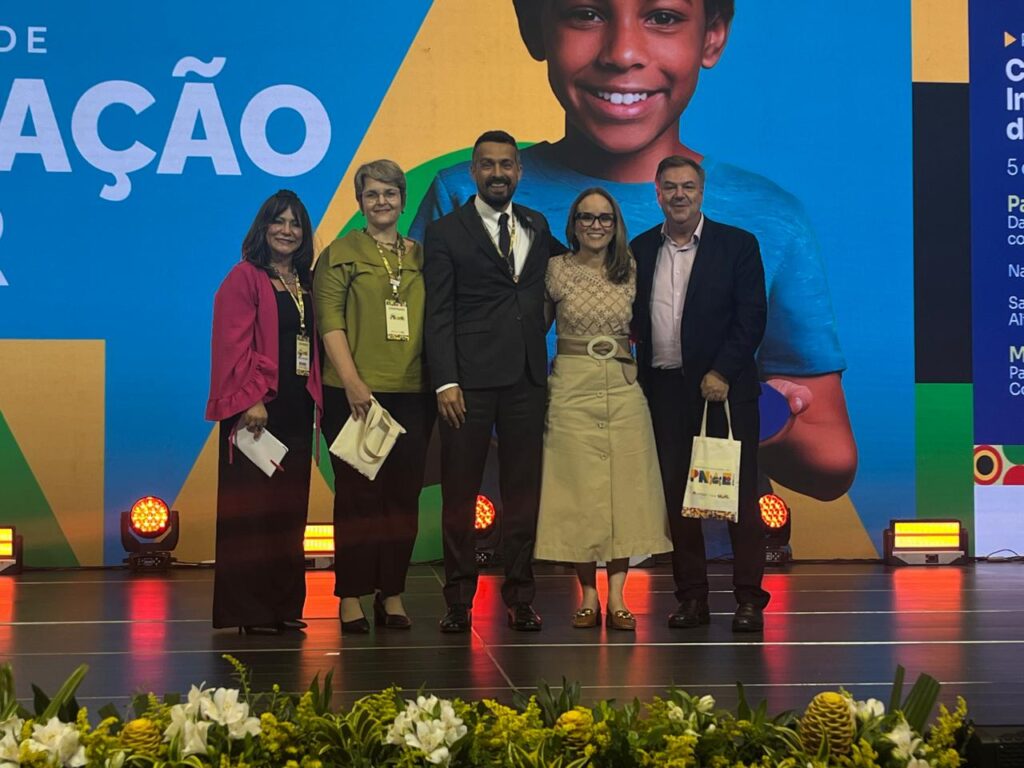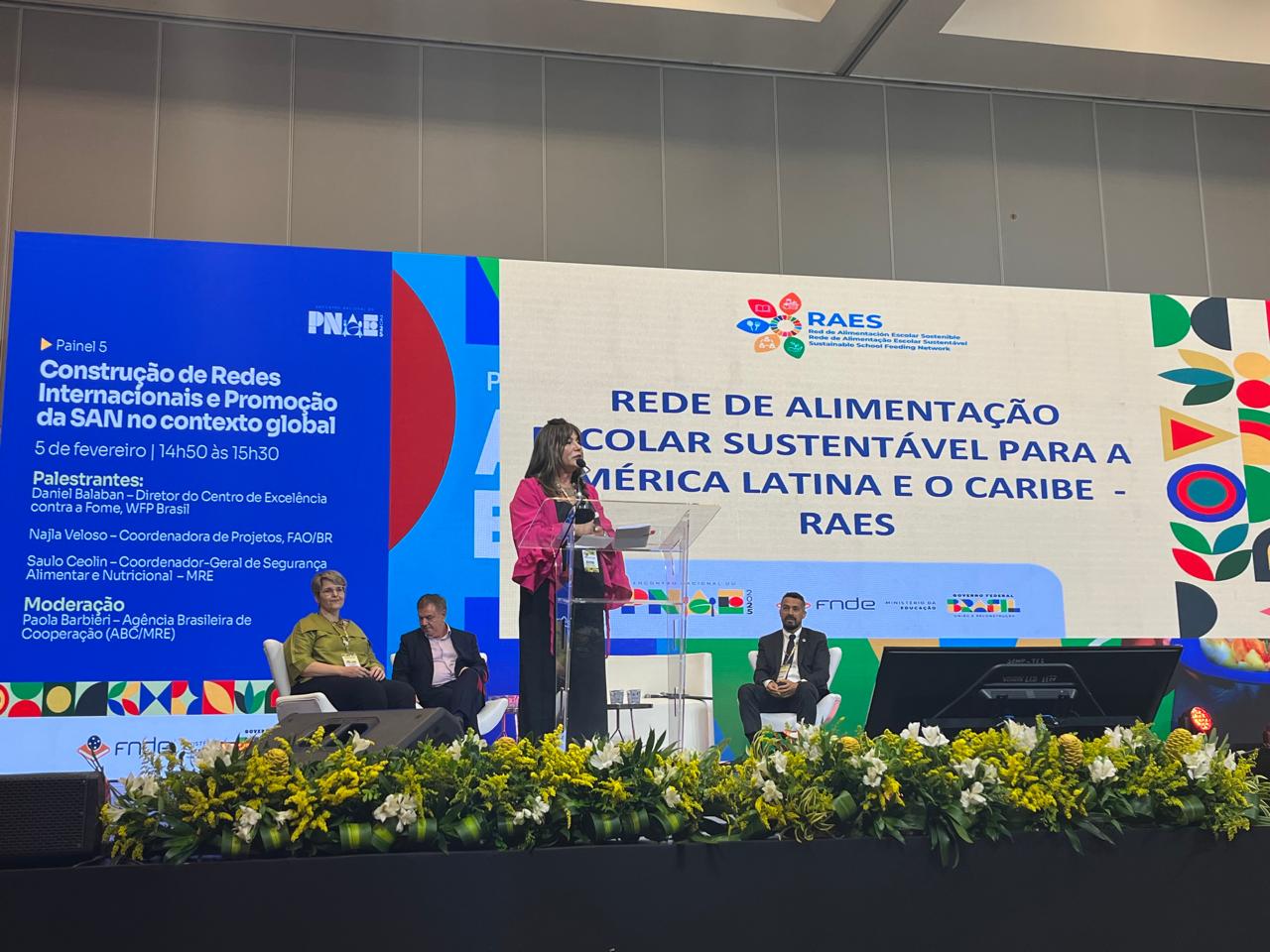Initiative created by the Brazilian government, with the executive secretariat of FAO, was highlighted in a panel on international cooperation and school feeding.
Paulo Beraldo and Palova Brito
Brasília, Brazil, February 6, 2025 – During the National Meeting of the National School Feeding Programme (PNAE) of Brazil, organized by the National Fund for Educational Development (FNDE) in the city of Brasília, the actions developed by the Sustainable School Feeding Network – RAES were presented to an audience of approximately 1,500 school feeding professionals from all over the country. The event took place on February 4 and 5.
In the panel on international cooperation on school feeding, Najla Veloso, Executive Secretary of the Network, explained that RAES is an initiative of the Brazilian government, created in 2018, as part of its commitment to sharing experiences and providing technical support to countries in Latin America and the Caribbean, which has been happening since 2009.

As an action of Trilateral South-South Cooperation, this Network is jointly implemented by the Brazilian Cooperation Agency of the Ministry of Foreign Affairs (ABC/MRE), the FNDE and the executive secretariat of the Food and Agriculture Organization of the United Nations (FAO). It also has 17 member countries: Belize, Brazil, Bolivia, Chile, Colombia, Cuba, El Salvador, Ecuador, Honduras, Guatemala, Paraguay, Peru, the Dominican Republic, Saint Lucia, Saint Kitts and Nevis, Suriname, and Uruguay.
According to Najla Veloso, the Network operates based on the fundamental principle of the human right to adequate food in schools, through school feeding programmes, in which the vision of social protection gives way to a social policy with the potential to reach all students. “Eating at school is a right for every citizen who needs to develop cognitively and have enhanced opportunities for learning,” she stated.
As a Network, countries work together to strengthen and consolidate school feeding programmes in the region based on guidelines such as the universalization of student coverage, intersectorality, social participation, infrastructure improvement, adequate and healthy menus, food and nutrition education, and public procurement from family farming, among other areas.

According to Paola Barbieri, project analyst at ABC/MRE, the partnership with international organizations such as FAO and the World Food Programme (WFP) arose due to the growing demand from countries for international cooperation in school feeding. “After 16 years of this joint work, 80 countries in the global south have already been supported.“
Saulo Ceolin, coordinator of the Global Alliance Against Hunger and Poverty and general coordinator of Food and Nutritional Security at the Ministry of Foreign Affairs (MRE), highlighted that the Alliance was conceived by the government of Brazil to accelerate global efforts to eradicate hunger and poverty.
“The Alliance seeks to enable and accelerate solutions by connecting countries and institutions willing to offer some type of financing or technical capacity to those ready to implement public policies listed in our ‘basket’ of policies,” he explained. So far, the Alliance has around 160 participating members, including 91 countries, 43 foundations, 25 international organizations, and 10 international financial institutions. The RAES is in the process of joining this initiative.
The director of the WFP Centre of Excellence Against Hunger in Brazil, Daniel Balaban, highlighted that school feeding programs worldwide have significantly advanced in recent years. “In 2011, fewer than 20 countries had national school feeding programmes. Today, 170 countries have these programmes“

PNAE beyond Brazilian borders
With nearly 70 years since its creation, PNAE serves approximately 40 million students in 155,000 public schools and provides around 10 billion meals per year. On the international stage, this programme has been a reference for many countries, especially in the LAC region and Africa. Since 2009, the Brazilian government and FAO have cooperated on the topic of school feeding through the Brazil-FAO International Cooperation Programme.
In 2023, Brazil became co-chair of the Global School Meals Coalition, alongside France and Finland. This year, the country will host the 2nd Global School Meals Summit on September 18 and 19, 2025, in the city of Fortaleza, in the state of Ceará. Given the importance of the topic for the Brazilian government, the opening of the event was attended by the President of Brazil, Luiz Inácio Lula da Silva, First Lady Janja Lula da Silva, ‘ambassador of school feeding,’ and the Minister of Education, Camilo Santana.
Brazilian school feeding policy
During the event, the proposal for Brazil’s School Feeding Policy was presented, aiming to strengthen the government’s role in the implementation and consolidation of the PNAE, as well as to establish school feeding as a fundamental right of students. It was also mentioned that a National School Feeding Council will be created to support the monitoring and oversight of PNAE. The legal framework is currently under discussion.
“This programme, which is already enormous, can be even better with the design of the Brazilian school feeding policy, taking a bigger step towards respecting regional specificities, the diversity of our food culture, and federal balance,” stated FNDE President Fernanda Pacobahyba.

Advancements
During the meeting, the Brazilian government announced a measure that reduces the limit of processed and ultra-processed foods offered in public schools from 20% to 15% in 2025. By 2026, the percentage will drop to 10%. An increase in per capita funding for youth and adult education was also announced, benefiting 2.1 million Brazilians attending public schools.
Additionally, the Alimentação Nota 10 Project was launched, which will train nutritionists and school cooks on topics related to food and nutritional security, the human right to food, environmental topics, and family farming. The event also awarded the 20 best practices that participated in the 5th Food and Nutrition Education Journey.







